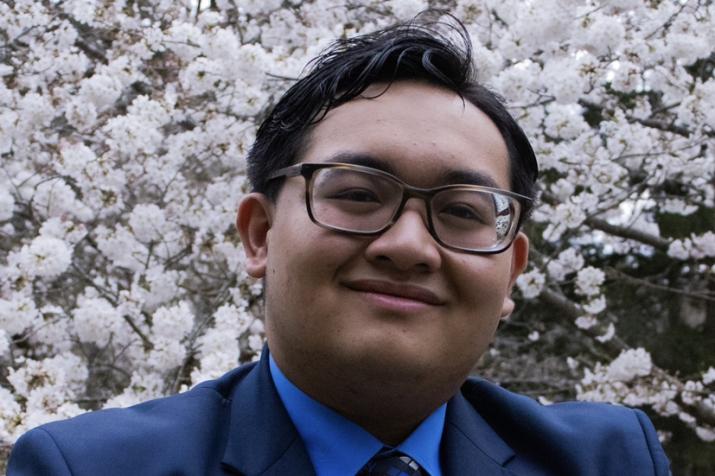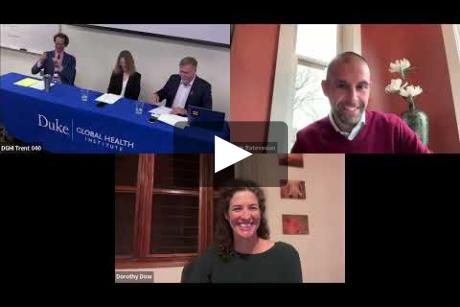
Elaijah Lapay, a Program II student at Duke, is focusing his studies on global health, migrant health and healthcare access.
Published January 25, 2022, last updated on January 27, 2022 under Student Stories
Elaijah Lapay’s want for equitable healthcare resonates in his studies, but also in his family life. A sophomore in Duke’s Program II, in which students custom-design a major around a specific subject, Lapay, a Filipino-American, is studying migrant health and healthcare access. But his interest in the topic may be best reflected in what recently happened to his grandmother, who moved from the Visayas Islands in the Philippines to live with his family – first in Mississippi and then, in eastern North Carolina.
In 2021, Lapay’s grandmother was injured in a fall and later caught COVID-19, requiring hospital care. But no one at the hospital spoke Bisaya, her native language. Lapay’s mom became the sole interpreter and at times, that proved to be difficult.
Lapay says his grandmother only knowing one language was never an issue in everyday life – until she needed medical care.
“It put a lot of things into perspective for me,” he says. “There are hundreds of thousands who experience what my grandmother did at the hospital, and language access has been such a big thing for me to focus on, and how much of a role it plays in healthcare delivery.”
We talked with Lapay about how he’s exploring global health in his classes and extracurricular activities, including his experiences on a Bass Connections research project and with the student-led Duke Medical Ethics Journal.
Why did you choose the Program II track?
I didn’t want to do a STEM track and do heavy course work, while being pre-med, but what I wanted to do had to create a path for studying immigrants, migrants and addressing global public health. I knew I could develop that idea with a Program II. And Emily Esmaili (a DGHI adjunct assistant professor and pediatrician who works with refugee families) is my faculty sponsor for Program II. She’s fantastic. I met her through taking a House Course on refugee healthcare.
Tell us about your Bass Connections project working with Root Causes, which has been working to ensure immigrant families have access to food during the pandemic.
We looked at understanding food insecurity in this population and the changes caused by COVID. I still do work for Root Causes as part of their research team, and I’m also learning Spanish because of my time with the project. I make calls and talk to the families in Spanish. I want to be that person taking part in language access, which has been so powerful to me. I want to have an impact in my research and practice years down the line.
How else did your grandmother’s experience influence you?
When I was four, my grandmother immigrated to the U.S. to help raise me while my parents worked. I wasn’t able to visit my grandmother in the hospital when she had COVID in 2021. It’s hard to think about much else when those are the circumstances you’re faced with. I really reflected on the circumstances of her in the hospital, that kind of patient interaction in healthcare. It also made me realize my privilege of getting an education at Duke, and the more I thought about it, the more I thought about what I want to study, and be someone that doesn’t allow what happened to my family to happen to them – even if I don’t know them.
(Lapay recounted his grandmother’s experience in an essay, which won first place in the Duke’s Student Collaborative on Health Policy writing contest in Fall 2021).
You've written several articles for DMEJ. Which one meant the most to you?
It was called “Medical Multilingualism” for the Fall 2021 issue. It’s about why it’s important to have medical doctors who can speak the language of their patients, and for medical schools to require students to have a second language. The article had the least to do with the classes I was taking at the time, but it’s the most personal to me with what my grandmother experienced. The DMEJ is a wonderful forum to have for students who don’t have anywhere else to talk about certain things academically or personally. I feel what I wrote about is written with ethics in mind, but it’s humanities driven. I’ve been writing for DMEJ since my first semester at Duke in 2020.
Why should everyone be involved – from the highest-level such as policymakers to an everyday citizen – in achieving global health?
Global health is the reduction of harm and suffering. It’s also not just about doctors and nurses, it’s about mitigating suffering and harm from physical injuries, communicable diseases like COVID and more. It can also be about your mental, social and spiritual health. At the core, that’s what global health is trying to do – care about the human condition and reduce the suffering. To care is to actually care about others before suffering and harm happens to them.


